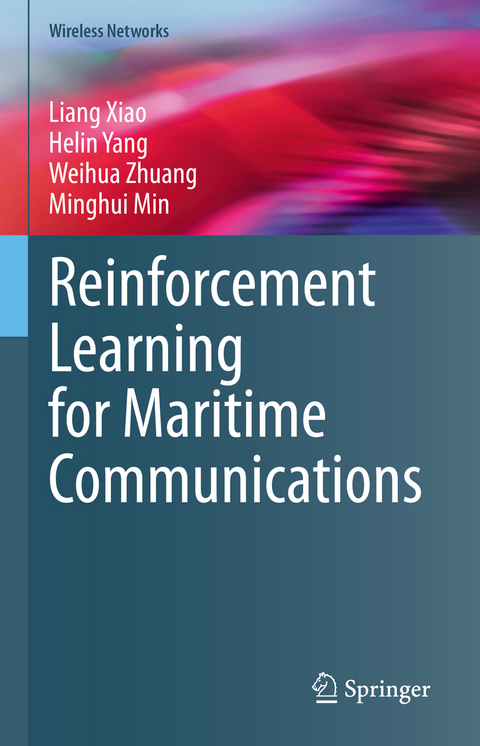
Reinforcement Learning for Maritime Communications
Springer International Publishing (Verlag)
978-3-031-32137-5 (ISBN)
The power and spectrum resource in maritime communications can be jointly optimized to guarantee the quality of service (i.e., security and reliability requirements), and reinforcement leaning is adopted to smartly choose the resource allocation strategy. Moreover, learning based privacy-aware offloading and location privacy protection are proposed to intelligently guarantee the privacy-preserving requirements of maritime ships or (sensors). Therefore, these communication schemes based on reinforcement learning algorithms can help maritime communication systems to improve the information security, especially in dynamic and complex maritime environments.
This timely book also provides broad coverage of the maritime wireless communication issues, such as reliability, security, resource management, and privacy protection. Reinforcement learning based methods are applied to solve these issues. This book includes four rigorously refereed chapters from prominent international researchers working in this subject area. The material serves as a useful reference for researchers, graduate students. Practitioners seeking solutions to maritime wireless communication and security related issues will benefit from this book as well.
Liang Xiao (Senior Member, IEEE) received the B.S. degree in communication engineering from the Nanjing University of Posts and Telecommunications, China, in 2000, the M.S. degree in electrical engineering from Tsinghua University, China, in 2003, and the Ph.D. degree in electrical engineering from Rutgers University, NJ, USA, in 2009. She was a Visiting Professor with Princeton University, Virginia Tech, and the University of Maryland, College Park. She is currently a Professor with the Department of Information and Communication Engineering, Xiamen University, Xiamen, China. She was a recipient of the Best Paper Award for 2016 INFOCOM Big Security WS and 2017 ICC. She has served as an Associate Editor for IEEE Transactions on Information Forensics and Security and a Guest Editor for IEEE Journal of Selected Topics in Signal Processing.
Helin Yang (Member, IEEE) received the B.S. and M.S. degrees from the School of Telecommunications Information Engineering, Chongqing University of Posts and Telecommunications, in 2013 and 2016, respectively, and the Ph.D. degree from the School of Electrical and Electronic Engineering, Nanyang Technological University, Singapore, in 2020. He is currently an Associate Professor with the Department of Information and Communication Engineering, Xiamen University, Xiamen, China. His current research interests include wireless communication, the Internet of Things, and resource management.
Weihua Zhuang (Fellow, IEEE) received the B.Sc. and M.Sc. degrees from Dalian Marine University, China, and the Ph.D. degree from the University of New Brunswick, Canada, all in electrical engineering. She is a University Professor and a Tier I Canada Research Chair in wireless communication networks at the University of Waterloo, Canada. Her research focuses on network architecture, algorithms and protocols, and service provisioning in future communication systems. She is an Elected Member of the Board of Governors and the Executive Vice President of the IEEE Vehicular Technology Society. She is a fellow of the Royal Society of Canada, the Canadian Academy of Engineering, and the Engineering Institute of Canada. She was a recipient of 2021 Women's Distinguished Career Award from the IEEE Vehicular Technology Society, the 2021 Technical Contribution Award in Cognitive Networks from IEEE Communications Society, the 2021 R. A. Fessenden Award from IEEE Canada, and the 2021 Award of Merit from the Federation of Chinese Canadian Professionals in Ontario. She was the General Co-Chair of 2021 IEEE/CIC International Conference on Communications in China (ICCC), the Technical Program Chair/Co-Chair of 2017/2016 IEEE VTC Fall, the Technical Program Symposia Chair of 2011 IEEE GLOBECOM, an IEEE Communications Society Distinguished Lecturer from 2008 to 2011, and the Editor-in-Chief of the IEEE Transactions on Vehicular Technology from 2007 to 2013.
Minghui Min (Member, IEEE) received the B.S. degree in automation from QuFu Normal University, Rizhao, China, in 2013, the M.S. degree in control theory and control engineering from Shenyang Ligong University, joint training with, Shenyang Institute of Automation, Chinese Academy of Sciences, Shenyang, China, in 2016, and the Ph.D. degree with the Department of Information and Communication Engineering, Xiamen University, Xiamen, China, in 2020. She was a Visiting Scholar with the Department of Computer Science and Engineering, University of Houston, Houston, TX, USA. She is currently a Lecturer with the School of Information and Control Engineering, China University of Mining and Technology, Xuzhou, China. Her research interests include privacy, network security, and wireless communications.
Introduction.- Intelligent Internet of Things Networking Architecture.- Intelligent IoT Network Awareness.- Intelligent Traffic Control.- Intelligent Resource Scheduling.- Mobile Edge Computing Enabled Intelligent IoT.- Blockchain Enabled Intelligent IoT.- Conclusions and Future Challenges.
| Erscheinungsdatum | 27.07.2023 |
|---|---|
| Reihe/Serie | Wireless Networks |
| Zusatzinfo | IX, 146 p. 50 illus., 49 illus. in color. |
| Verlagsort | Cham |
| Sprache | englisch |
| Maße | 155 x 235 mm |
| Gewicht | 391 g |
| Themenwelt | Mathematik / Informatik ► Informatik ► Netzwerke |
| Informatik ► Theorie / Studium ► Künstliche Intelligenz / Robotik | |
| Technik ► Nachrichtentechnik | |
| Schlagworte | Deep learning • Intelligent Reflecting Surface • Maritime Wireless Communications • Privacy-Aware Offloading • Privacy Protection • Reinforcement Learning • Reliability • Resource Management • security |
| ISBN-10 | 3-031-32137-5 / 3031321375 |
| ISBN-13 | 978-3-031-32137-5 / 9783031321375 |
| Zustand | Neuware |
| Haben Sie eine Frage zum Produkt? |
aus dem Bereich


